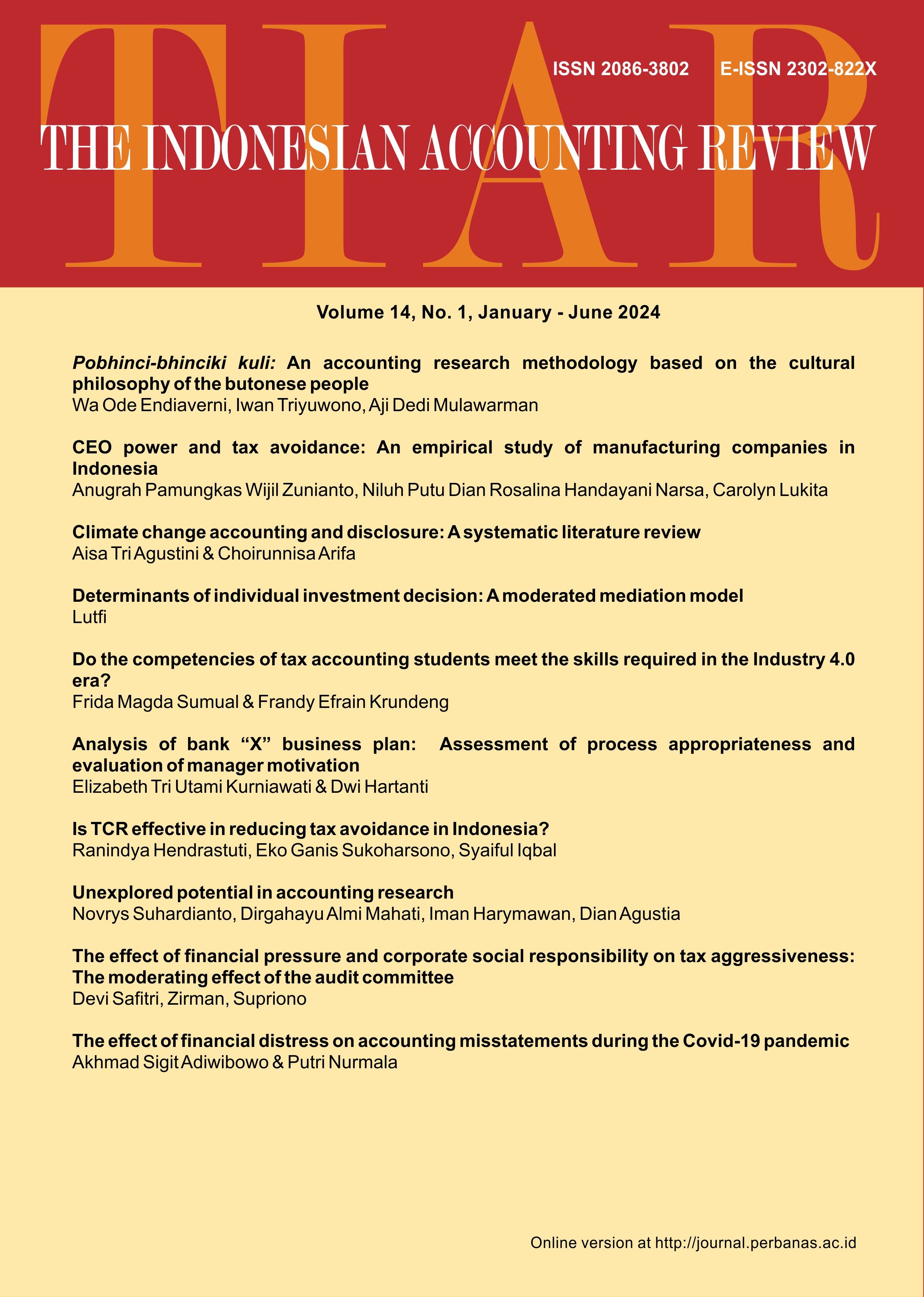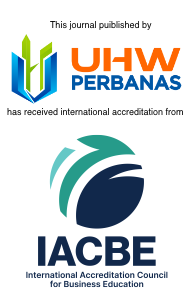The effect of financial pressure and corporate social responsibility on tax aggressiveness: The moderating effect of the audit committee
DOI:
https://doi.org/10.14414/tiar.v14i1.4401Keywords:
Financial pressure, Financial targets, External pressure, Corporate social responsibility, Audit committee, Tax aggressivenessAbstract
This research aims to examine the effect of financial pressure and corporate social responsibility (CSR) on tax aggressiveness. In addition, this research also investigates whether audit committee can moderate the effect of financial pressure and CSR on tax aggressiveness. In this research, the financial pressures include financial targets and external pressures. This quantitative research uses secondary data with the population of all manufacturing companies listed on the Indonesian Stock Exchange period 2019-2021. Sampling is conducted using purposive sampling technique involving 216 companies obtained during three years of observation. Data analysis is conducted using Smart PLS 3.0 with SEM-PLS application to test the direct and moderating effect. The results of this research show that financial target has a negative effect on tax aggressiveness, while external pressure has a positive effect on tax aggressiveness. CSR has no effect on tax aggressiveness. Audit committee cannot moderate the effect of financial target, external pressure, and CSR on tax aggressiveness. This research contributes to the development of accounting literacy, especially in the study of financial pressure, CSR, audit committee and tax aggressiveness. Measuring tax aggressiveness can be done using CETR by adding the CSR variable as an independent variable with GRI standards. In addition, this research also uses financial pressure variable from the fraud triangle theory which is related to tax aggressiveness.
References
Agung S, M. (2022). Capital Intensity, Tanggung Jawab Sosial Perusahaan, dan Tax Aggressiveness: Good Corporate Governance Sebagai Variabel Moderating. Litera: Jurnal Literasi Akuntansi, 2(1), 74–85. https://doi.org/10.55587/jla.v2i1.28.
Ann, S., & Manurung, A. H. (2019). The Influence of Liquidity, Profitability, Intensity Inventory, Related Party Debt, and Company Size To Aggressive Tax Rate. Archives of Business Research, 7(3), 105–115. https://doi.org/10.14738/abr.73.6319.
Asprilla, V., & Adi, P. H. (2023). Pengaruh Profitabilitas Terhadap Penghindaran Pajak dengan Komite Audit sebagai Variabel Moderasi. Owner: Riset & Jurnal Akuntansi, 7(3), 2031–2042. https://doi.org/10.33395/owner.v7i3.1522.
Ayu, Z. W., & Durya, N. P. M. A. (2021). Pengaruh Tekanan Keuangan Terhadap Penghindaran Pajak. Accounting Cycle Journal, 2(2), 38–60.
Azzam, A., & Subekti, K. V. (2019). Pengaruh Profitabilitas dan Ukuran Perusahaan Terhadap Agresivitas Pajak Dengan Good Corporate Governance Sebagai Variabel Moderating. Media Akuntansi Perpajakan, 4(2), 1–10.
Bahri, S., & Cahyani, F. A. (2016). Pengaruh Kinerja Lingkungan Terhadap Corporate Financial Performance Dengan Corporate Social Responsibility Disclosure Sebagai Variabel Intervening. Ekonika: Jurnal Ekonomi Universitas Kadiri, 1(2), 117–142.
Chandrawati, N. B., & Ratnawati, D. (2021). Studi Financial Statement Fraud dengan Fraud Triangle Theory. E-Bisnis : Jurnal Ilmiah Ekonomi Dan Bisnis, 14(1), 147–159. https://doi.org/10.51903/e-bisnis.v14i1.383.
Chen, J. C., & Roberts, R. W. (2010). Toward a More Coherent Understanding of the Organization–Society Relationship: A Theoretical Consideration for Social and Environmental Accounting Research. Journal of Business Ethics, 97(4), 651–665. https://doi.org/10.1007/s10551-010-0531-0.
Chen, S., Chen, X., Cheng, Q., & Shevlin, T. (2010). Are Family Firms More Tax Aggressive Than Non-Family Firms? Financial Economics, 95(1), 41–61. https://doi.org/10.1016/j.jfineco.2009.02.003.
Choo, F., & Tan, K. (2007). An “American Dream” theory of corporate executive Fraud. Accounting Forum, 13(2), 203–215.
Christy, J., & Subagyo. (2019). Pengaruh Firm Size, Sales Growth, dan ROA Terhadap Penghindaran Pajak Dengan Komite Audit Sebagai Variabel Moderasi. Jurnal Akuntansi, 19(2), 139–150.
Cressey, D. R. (1950). The Criminal Violation of Financial Trust. American Sosiological Review, 15(6), 738–743.
Dewi, H. K. (2019). Tax Justice Laporkan Penghindaran Pajak, Indonesia Rugi US$ 14 Juta. Kontan.Co.Id. https://nasional.kontan.co.id/news/tax-justice-laporkan-bentoel-lakukan-penghindaran-pajak-indonesia-rugi-rp-14-juta.
Dewi, N. N. K., & Jati, I. K. (2014). Pengaruh Karakter Eksekutif, Karakteristik Perusahaan, dan Dimensi Tata Kelola Perusahaan Yang Baik Pada Tax Avoidance di Bursa Efek Indonesia. E-Jurnal Akuntansi Universitas Udayana, 6(2), 249–260.
Diantari, P. R., & Ulupui, I. A. (2016). Pengaruh Komite Audit, Proporsi Komisaris Independen, Dan Proporsi Kepemilikan Institusional Terhadap Tax Avoidance. E-Jurnal Akuntansi, 16(1), 702–732.
Diany, Y. A., & Ratmono, D. (2014). Determinan Kecurangan Laporan Keuangan: Pengujian Teori Fraud Triangle. Diponegoro Journal of Accounting, 3(2), 1–9.
E.G, D. M., & Murtanto, M. (2021). Pengaruh Corporate Governance, Ukuran Perusahaan Dan Profitabilitas Terhadap Agresivitas Pajak Perusahaan. Jurnal Akuntansi Trisakti, 8(1), 109–122. https://doi.org/10.25105/jat.v8i1.8679.
Fionasari, D., Savitri, E., & Andreas. (2017). Pengaruh Pengungkapan Corporate Social Responsibility terhadap Agresivitas Pajak (Studi pada Perusahaan yang Listing di Bursa Efek Indonesia). SOROT, 12(2), 95–105. https://doi.org/10.31258/sorot.12.2.4557.
Firmansyah, A., & Estutik, R. S. (2021). Peran Tata Kelola Perusahaan Dalam Kinerja Tanggung Jawab Lingkungan, Pengungkapan Tanggung Jawab Sosial, Agresivitas Pajak. Penerbit Adab.
Frank, M. M., Lynch, L. J., & Rego, S. O. (2009). Tax Reporting Aggressiveness and Its Relation to Aggressive Financial Reporting. The Accounting Review, 84(2), 467–496. https://doi.org/10.2308/accr.2009.84.2.467.
Ghandur, D. I., Sari, R. N., & Anggraini, L. (2019). Analisis Fraud Pentagon Dalam Mendeteksi Kecurangan Laporan Keuangan. Jurnal Akuntansi, 8(1), 26–40.
Gray, R., Owen, D., & Adams, C. (1996). Accounting & Accountability: Changes and Challenges in Corporate Social and Environmental Reporting. Prentice Hall.
Hanlon, M., & Heitzman, S. (2010). A Review of Tax Research. Journal of Accounting and Economics, 50(2–3), 127–178. https://doi.org/10.1016/j.jacceco.2010.09.002.
Harjito, Y., Sari, C. N., & Yulianto. (2017). Tax Aggressiveness Seen From Company Characteristics and Corporate Social Responsibility. Journal of Auditing, Finance, and Forensic Accounting (JAFFA), 5(2), 77–91. https://doi.org/10.21107/jaffa.v5i2.3765.
Harsono, B., & Yoren, S. (2022). Analysis the Influence of Audit Committee Characteristics on Tax Aggressiveness in Indonesia. Amnesty: Jurnal Riset Perpajakan, 05(02), 258–275. https://doi.org/10.26618/jrp.v5i2.9582.
Herlinda, A. R., & Rahmawati, M. I. (2021). Pengaruh Profitabilitas, Likuiditas, Leverage Dan Ukuran Perusahaan Terhadap Agresivitas Pajak. Ilmu Dan Riset Akuntansi, 10(1), 1–18.
Iqbal, M., & Murtanto. (2016). Analisa Pengaruh Faktor-Faktor Fraud Triangle Terhadap Kecurangan Laporan Keuangan Pada Perusahaan Property dan Real Estate Yang Terdaftar di Bursa Efek Indonesia. Seminar Nasional Cendekiawan 2016.
Jensen, M. C., & Meckling, W. H. (1976). Theory of the Firm: Managerial Behavior, Agency Cost and Ownership Structure. Journal of Financial Economics, 3(4), 305–360.
Junensie, P. R., Trisnadewi, A. A. A. E., & Rini, I. G. A. I. S. (2020). Pengaruh Ukuran Perusahaan, Corporate Social Responsibility, Capital Intensity, Leverage dan Komisaris Independen terhadap Agresivitas Pajak Penghasilan Wajib Pajak Badan pada Perusahaan Industri Konsumsi di Bursa Efek Indonesia Tahun 2015-2017. Wacana Ekonomi (Jurnal Ekonomi, Bisnis Dan Akuntansi), 19(1), 67–77. https://doi.org/10.22225/we.19.1.1600.67-77.
Khasanah, F., & Indriyani, F. (2021). Pengaruh Leverage, Likuiditas, dan Capital Intensity Terhadap Tax Avoidance Dengan Komite Audit Sebagai Variabel Moderating. Journal of Accounting and Digital Finance, 1(2), 125–137. https://doi.org/10.53088/jadfi.v1i2.133.
Kogha, V. R., & Nursyirwan, V. I. (2021). Pengaruh Inventory Intensity, Capital Intensity dan Corporate Social Responsibility Terhadap Agresivitas Pajak. Sakuntala, 1(1).
Kurniati, F. (2021). The Effect Of Corporate Social Responsibility, Capital Intensity, ROA And Inventory Intensity Disclosure On Tax Aggressiveness (Study on Companies Conducting Initial Public Offerings 2015 – 2017). International Journal of Economics, Business, and Entrepreneurship (IJEBE), 4(2), 68–76. https://doi.org/10.23960/ijebe.v4i2.80.
Kusumawati, W. T., & Hardiningsih, P. (2016). The Effect of Institutional Ownership and Corporate Social Responsibility to The Tax Aggressiveness. Proceeding International Conference of Banking, Accounting, Management and Economics & Call For Papers (ICOBAME).
Laia, K. (2020). Dugaan Manipulasi Data Ekspor Pulp Larut, Kerugian Pajak Rp 1,9T. Betahita.Id. https://betahita.id/news/detail/5796/dugaan-manipulasi-data-ekspor-pulp-larut-kerugian-pajak-rp-1-9t.html.html.
Lako, A. (2011). Dekonstruksi CSR dan Reformasi Paradigma Bisnis dan Akuntansi. Erlangga.
Leksono, A. W., Albertus, S. S., & Vhalery, R. (2019). Pengaruh Ukuran Perusahaan dan Profitabilitas terhadap Agresivitas Pajak pada Perusahaan Manufaktur yang Listing di BEI Periode Tahun 2013–2017. JABE (Journal of Applied Business and Economic), 5(4), 301–314. https://doi.org/10.30998/jabe.v5i4.4174.
Lietz, G. M. (2013). Tax Avoidance vs. Tax Aggressiveness: A Unifying Conceptual Framework. SSRN Electronic Journal. https://doi.org/10.2139/ssrn.2363828.
Lou, Y.-I., & Wang, M.-L. (2009). Fraud Risk Factor Of The Fraud Triangle Assessing The Likelihood Of Fraudulent Financial Reporting. Journal of Business & Economics Research, 7(2), 61–78. https://doi.org/10.19030/jber.v7i2.2262.
Manurung, J. T. (2020). Praktik Penghindaran Pajak. DJP. https://www.pajak.go.id/id/artikel/praktik-penghindaran-pajak-di-indonesia.
Margaretha, A., Susanti, M., & Siagian, V. (2021). Pengaruh Deferred Tax, Capital Intensity dan Return On Asset terhadap Agresivitas Pajak. Jurnal Akuntansi, 13(1), 160–172. https://doi.org/10.28932/jam.v13i1.3537.
Masyitah, E., Sar, E. P., Syahputri, A., & Julyanthry. (2022). Pengaruh Leverage, Profitabilitas dan Ukuran Perusahaan Terhadap Agresivitas Pajak (Studi Empiris Perusahaan Plastik dan Kemasan Yang Terdaftar Di BEI Periode 2016-2020). Jurnal Akuntansi Dan Pajak, 23(1), 1–10. https://doi.org/10.29040/jap.v23i1.5854.
Natalya, D. (2018). Pengaruh Capital Intensity, Leverage dan Profitabilitas Terhadap Tax Agresivitas Dengan Kinerja Pasar sebagai Variabel Moderating. Media Akuntansi Perpajakan, 3(1), 37–55. https://doi.org/10.52447/map.v3i1.1260.
Ningrum, D. P., Masripah, & Wibawaningsih, E. J. (2020). Pengaruh Pengungkapan Corporate Social Responsibility Terhadap Agresivitas Pajak Yang Di Moderasi Dengan Mekanisme Corporate Governance. Prosiding Biema (Business Management, Economic, and Accounting National Seminar), 1, 1569–1585.
Noviawan, L. A., Handajani, L., & Putra, N. N. A. (2020). Pengaruh Komite Audit dan Managerial Entrenchmnet terhadap Agresivitas Pajak serta Implikasinya terhadap Kinerja Keuangan Perusahaan. E-Jurnal Akuntansi, 30(2), 428–449. https://doi.org/10.24843/EJA.2020.v30.i02.p12.
Nugraha, N. B., & Meiranto, W. (2015). Pengaruh Corporate Social Responsibility, Ukuran Perusahaan, Profitabilitas, Leverage dan Capital Intensity Terhadap Agresivitas Pajak. Diponegoro Journal of Accounting, 4(4), 1–14.
Octaviana, N. E., & Rohman, A. (2014). Pengaruh Agresivitas Pajak Terhadap Corporate Social Responsibility: Untuk Menguji Teori Legitimasi (Studi Empiris Pada Perusahaan Pertambangan dan Properti yang Terdaftar di Bursa Efek Indonesia Tahun 2009-2012). Diponegoro Journal of Accounting, 3(2), 1–12.
Ortas, E., & Gallego-Álvarez, I. (2020). Bridging The Gap Between Corporate Social Responsibility Performance and Tax Aggressiveness: The Moderating Role of National Culture. Accounting, Auditing and Accountability Journal, 33(4), 825–855. https://doi.org/10.1108/AAAJ-03-2017-2896.
Pranata, I. P. A. A., Adhitanaya, K., Rizaldi, M. F., Winanda, G. B. E., Lestari, N. M. I. D., & Astuti, P. D. (2021). The Effect of Corporate Social Responsibility , Firm Size , and Leverage on Tax Aggressiveness : An Empirical Evidence. Universal Journal of Accounting and Finance, 9(6), 1478–1486. https://doi.org/10.13189/ujaf.2021.090624.
Pratama, I., & Suryarini, T. (2020). The Role Of Independent Commissioners In Moderating The Effect Of Transfer Pricing, Capital Intensity And Profitability Towards Tax Aggressivity. Accounting Analysis Journal, 9(3), 208–214. https://doi.org/10.15294/aaj.v9i3.42687.
Priantara, D. (2013). Fraud Auditing and Investigation. Mitra Wacana Media.
Puspitadewi, E., Rine, & Sormin, P. (2018). Pengaruh Fraud Diamond Dalam Mendeteksi Financial Statement Fraud (Studi Pada Perusahaan Manufaktur Yang Terdaftar Di Bursa Efek Indonesia Tahun 2014 – 2016). Jurnal Akuntansi, 12(2), 146–162.
Raflis, R., & Ananda, D. R. (2020). Dampak Corporate Governance Dalam Memoderasi PengaruhLikuiditas, Leverage dan Capital Intensity Pada Agresivitas PajakPerusahaan Pertambangan. Jurnal Ekonomi Dan Bisnis Dharma Andalas, 22(1), 120–133.
Rahman, M. J., & Jie, X. (2024). Fraud Detection Using Fraud Triangle Theory: Evidence from China. Journal of Financial Crime, 31(1), 101–118. https://doi.org/10.1108/JFC-09-2022-0219.
Rahmawati, N. T., & Jaeni. (2022). Analisis Pengaruh Capital Intensity, Leverage, Profitabilitas, Ukuran Perusahaan, dan Perputaran Persediaan Terhadap Agresivitas Pajak. Jurnal Ilmiah Mahasiswa Akuntansi, 13(2), 628–636. https://doi.org/10.23887/jimat.v13i02.
Ricardo, R., & Suhendah, R. (2023). The Effect of the Fraud Triangle in Detecting Fraudulent Financial Reporting in Indonesian Banking Sector Companies. International Journal of Application on Economics and Business, 1(3), 1307–1317. https://doi.org/10.24912/ijaeb.v1i3.1307-1317.
Sagala, W. M., & Ratmono, D. (2015). Analisis Pengaruh Pengungkapan Corporate Social Responsibilty Terhadap Agresivitas Pajak. Diponegoro Journal of Accounting, 4(3), 2015.
Sarosa, W., & Amri, M. (2008). CSR untuk penguatan kohesi sosial. Indonesia Business Links.
Sarstedt, M., Ringle, C. M., & Hair, J. (2017). Partial Least Squares Structural Equation Modeling. In C. Homburg, M. Klarmann, & A. Vomberg (Eds.), Handbook of Market Research (pp. 1–40). Springer. https://doi.org/10.1007/978-3-319-05542-8_15-1.
Sihombing, S., Pahala, I., & Armeliza, D. (2021). Pengaruh Good Corporate Governance, Capital Intensity, Proftabilitas Terhadap Agresivitas Pajak. Jurnal Akuntansi, Perpajakan Dan Auditing, 2(2), 416–434. https://doi.org/10.21009/japa.0202.13.
Skousen, C. J., Smith, K. R., & Wright, C. J. (2008). Detecting and Predecting Financial State ment Fraud: The Effecti veness of The Fraud Triangle and SAS 99. https://doi.org/10.2139/ssrn.1295494.
Suprapti, E. (2017). Pengaruh Tekanan Keuangan Terhadap Penghindaran Pajak. Jurnal Reviu Akuntansi Dan Keuangan, 7(2), 1013–1022. https://doi.org/10.22219/jrak.v7i2.15.
Suyanto, S., Alfiani, H., Apriliyana, S., & Siciliya, A. R. (2021). Financial Pressure, Deferred Tax Expense, and Tax Aggressiveness: Audit Committee as the Moderation Variable. Jurnal Dinamika Akuntansi, 13(2), 180–195. https://doi.org/10.15294/jda.v13i2.33953.
Tuanakotta, M. T. (2010). Akuntansi Forensik dan Audit Investigatif. Salemba Empat.
Utaminingsih, N. S., Kurniasih, D., Sari, M. P., & Helmina, M. R. A. (2022). The Role of Internal Control in the Relationship of Board Gender Diversity, Audit Committee, and Independent Commissioner on Tax Aggressiveness. Cogent Business and Management, 9(1–17). https://doi.org/10.1080/23311975.2022.2122333.
Wahyuni, L., Fahada, R., & Atmaja, B. (2017). The Effect of Business Strategy, Leverage, Profitability and Sales Growth on Tax Avoidance. Indonesian Management and Accounting Research, 16(2), 67–80. https://doi.org/10.25105/imar.v16i2.4686.
Wardani, D. K., Prabowo, A. A., & Wisang, M. N. (2022). Pengaruh Profitabilitas Terhadap Agresivitas Pajak Dengan Good Corporate Governance Sebagai Variabel Moderasi. Akurat: Jurnal Ilmiah Akuntansi, 13(1), 67–75.
Widarti. (2015). Pengaruh Fraud Triangle Terhadap Deteksi Kecurangan Laporan Keuangan Pada Perusahaan Manufaktur yang Terdaftar di Bursa Efek Indonesia (BEI). Jurnal Manajemen Dan Bisnis Sriwijaya, 13(2).
Wong, K. K.-K. (2013). Partial Least Square Structural Equation Modeling (PLS-SEM) Techniques Using SmartPLS. Marketing Bulletin, 24(1), 1–32.
Yogiswari, N. K. K., & Ramantha, I. W. (2017). Pengaruh Likuiditas Dan Corporate Social Responsibility Pada Agresivitas Pajak Dengan Corporate Governace Sebagai Variabel Pemoderasi. E-Jurnal Akuntansi, 21(1), 730–759.
Yunistiyani, V., & Tahar, A. (2017). Corporate Social Responsibility dan Agresivitas Pelaporan Keuangan Terhadap Agresivitas Pajak Dengan Good Corporate Governance Sebagai Pemoderasi. Jurnal Ilmiah Akuntansi, 2(1), 1–31. https://doi.org/10.23887/jia.v2i1.9610.
Downloads
Submitted
Published
How to Cite
Issue
Section
License
Copyright (c) 2024 The Indonesian Accounting Review

This work is licensed under a Creative Commons Attribution-NonCommercial 4.0 International License.

















